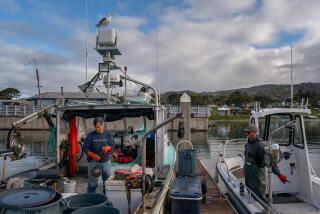New Coast Guard Rules, Boardings Anger Fishermen
An angry group of Ventura County fishermen delivered a distress signal to the U.S. Coast Guard on Thursday, bitterly complaining about a rash of recent vessel inspections and a tangle of new safety regulations.
At the meeting arranged by the office of Rep. Elton Gallegly (R-Simi Valley), some local fishermen told Coast Guard officials they had been boarded several times in a month and as many as nine times in a year.
Each time, the fishermen complained, Coast Guard officials would conduct lengthy inspections and often issue fines for failing to have proper paperwork and required safety equipment, such as Coast Guard-approved life rafts and radio transmitters.
“It’s like Nazi Germany,” said commercial diver James McClelland of Oxnard, describing what he considers harassment from Coast Guard patrols.
But Coast Guard officials defended the safety inspections of the commercial fishing vessels, saying the government is only trying to save lives in an industry that has slipped through regulatory nets for years.
“We are losing 250 fishing vessels and 150 fishermen a year in the U.S.,” said Stan Holden, the Coast Guard’s fishing vessel safety coordinator in California. “That’s more (loss of life) than any other industry in the United States. It’s the most dangerous industry in the U.S., including law enforcement and coal mining.”
The safety regulations stem in part from the federal Fishing Vessel Safety Act of 1988, which empowers the Coast Guard to set safety standards for commercial fishing vessels. As a safety device comes onto the market, the Coast Guard can require the fishermen to buy it and keep it on their vessels.
But fishermen argue that much of the required equipment is either too cumbersome or too expensive for them to keep on board. Safety equipment now required includes Emergency Position Indicating Radio Beacons, which send out distress signals for boats in trouble, self-inflating life rafts, immersion wet suits, flares and two-way radios. To fully equip a vessel could cost as much as $10,000, vessel examiner F. L. McClain said.
McClelland said that is the kind of money most fishermen just don’t have to spend.
“Many of these people are living day to day out there,” McClelland said after the meeting. “To have to pay for the equipment and pay the fines that are being doled out--it’s just not worth it to stay in business.”
Another fisherman, Jim Launius, agreed that the burden of paying for extra equipment was too great. “It’s hard for me to survive, let alone pay for stuff that we don’t even need,” he said. “We have a hard enough time as it is.”
In addition to safety equipment, the Coast Guard soon will require the fishermen to conduct safety drills and receive training in first aid and cardiopulmonary resuscitation.
Coast Guard Lt. David Boyd, an enforcement officer, said the new education program will help fishermen learn how to save lives. “No one can argue the merits of these requirements,” Boyd said.
But the fishermen do.
“I don’t need Big Brother to dictate to me what equipment I need to live or die by,” McClelland said. “We’ve been in this business all our lives.”
Launius said fishermen know the dangers of their job. “I’m not going to go out there and be unsafe,” he said.
But Coast Guard officials said the statistics and human tragedy suggest that the safety regulations are necessary.
According to the federal Marine Safety Council, Robert Barry, a former U.S. ambassador to Bulgaria, and his wife Peggy pushed for the Fishing Vessel Safety Act after their son and six others were killed when their 70-year-old fishing ship sank off the Alaska coastline.
“The catalyst may have been a tragic loss at sea,” Boyd said. “But legislation of this magnitude also has statistics to back it up.”
But the statistics might not be a fair measure because they are not localized, said Brian Miller, a field representative in Gallegly’s Oxnard office. For instance, he said, fishermen face far more dangerous conditions in Alaska than in local waters.
“The problem is that this law affects all of the coastal waters,” Miller said. “There are places where this law is needed. But we are looking for a way to get the Coast Guard to exempt some of the fishermen here.”
More to Read
Sign up for Essential California
The most important California stories and recommendations in your inbox every morning.
You may occasionally receive promotional content from the Los Angeles Times.










